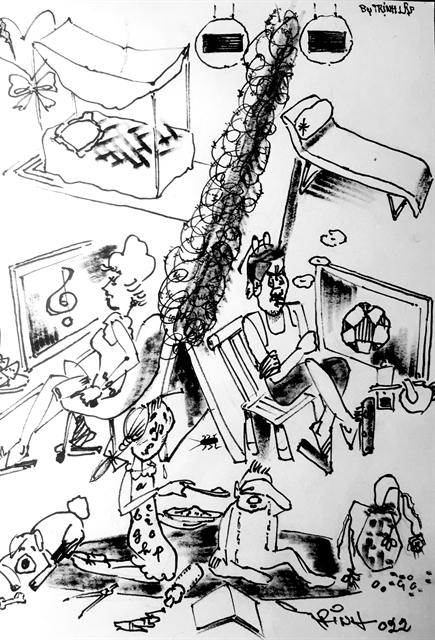
Illustration by Trịnh Lập
by Nguyễn Mỹ Hà
Last week, a National Assembly deputy made comments in a proposal for an amendment to the Anti-Domestic Violence Law, a suggestion that rocked the public.
"A husband who goes home from work and says nothing, or every time he opens his mouth, compliments a woman neighbour's good looks and caring attitude, or gets into a rage without any apparent reason, all of these actions can be categorised as an act of psychological domestic violence," the deputy said.
The amendment to the law against domestic violence has been discussed at the group stage, and deputies have been brainstorming acts that can be included.
"A woman always wants to be most beautiful in her partner's eyes," reads one comment in an article on the matter. "Statements like this, even said in an easy-going manner, can hurt a partner's self-esteem."
On Tuesday, the same deputy suggested that husbands having beer time after work should also be regarded as "domestic violence".
It's hard to draw an exact line as to what constitutes a mental disturbance in a relationship. When women mention men spending time drinking beer, or neglecting their housework, wife and children; men can say women spend time in the spa or the gym, and boldly comment on other men's muscular bodies or good looks.
"This is even more than violence to us," declared a man in his 40s who did not want to be named.
Law-makers have warned that emotional violence hurts women more and has a long-lasting effect.
It's necessary to categorise the use of words or manner to generalise unacceptable behaviours.
"These deputies need to find a better way to spend their time," wrote a Tuổi Trẻ reader on a related article.
"If we can all work on how to raise our living standards, and relieve stress from daily financial pressure, then relationships will suffer less. We need to be practical as not much has been done on physical domestic violence so far. Let's be more practical!"
More opinions revolved around gender equality, rather than just focusing on one partner.
Criticism or compliments are part of this life, and if all criticism is banned, and people are only allowed or encouraged to say good things, everything will sound very superficial and fake.
"We're working toward a mutual-respect relationship in a family, which made me want to turn back the time to 30 years ago when we could say a fact as it was. If you can't say a beauty queen is beautiful, or a bad act as bad, then we find ourselves lying most of the time!" wrote one commentator.
Another said: "I am a man, and I'm so stressed out when my wife gets home from work and doesn't respond to my attempts to start a conversation!"
Stress can be generated from both sides, and the new amendment should consider all opinions.
Reasons for domestic violence can be varied, according to social researchers.
But its lasting consequences leave severe wounds on both the mental and physical health of the victims. No matter how heavy or light it is, domestic violence leaves irreparable mental scars.
Victims have to go through fear, depression or even post-traumatic experiences, which can lead to flashbacks, nightmares, severe anxiety or impossible to control thoughts about the hurtful event.
When we talk about domestic violence, we must mention its effect on the children as it leaves a dark imprint on their childhood, hurting their mental well-being from when they are small.
Children growing up in families with domestic violence may close themselves off, be reserved and not grow up like those from gentler violent-free families.
The Steering Committee of the Việt Nam Women's Union has been channelling in its network of local unions to collect suggestions to be added to the amendment.
The list of definitions of domestic violence suggested includes physical, mental, sexual and economic abuse. Other suggestions include unwanted pregnancy control methods, forcing a woman into pregnancy prematurely, having more children than a woman wants, or pressuring a woman to bear a child illegally. Domestic violence can be included in cases where people cohabit but are not married, or with someone who has custodial rights over a child.
Further suggestions concern particular groups, such as pregnant women, women raising small children, children, the elderly, people with disabilities or those suffering from life-threatening illnesses.
A new suggestion is psychological consultations for those who engage in violence. People who hurt others would need to have a psychiatrist's consultation, to relieve the stress or troubles that may have led to their acts of violence.
There will also be consultation on methods of consultation systems and steps of arbitration with the participation of extended families, and the process of reporting domestic violence to the relevant authorities.
New changes will also see the provision of domestic violence shelters for women and children or safe destinations (other households) in the community.
Many opinions take into account the role of the Women's Union, for its continued roles in helping women and children who are victims of domestic violence, such as by providing them with credit loans or saving accounts.
The amendment may include defining different terms in which living income or assistance for victims to find jobs to support themselves or start up their own businesses is given.
The Women's Union also counts the number of girls and women who are victims of domestic violence and provides them with life skills and training so that they could get jobs to support themselves later.
So much needs to be done, and it is hardly about whether a man compliments a neighbour on her good looks or caring attitude.
The process is ongoing. Make your opinions heard now. VNS
OVietnam